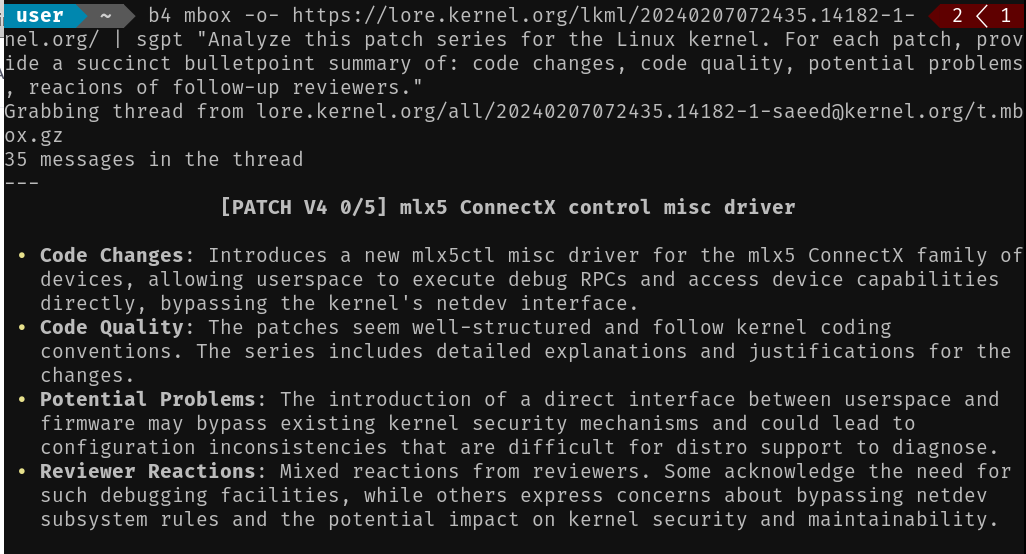Posts
208Following
156Followers
169Palmer Dabbelt
palmerSo it's not like I'd expect GPT to get everything, just to get ahead of the bad actors.
K. Ryabitsev-Prime 🍁
monsieuriconI'm working on b4 "code review" mode (grab a series, apply it to your tree, review every patch, send all your acked-by's, reviewed-by's, and individual comments as a one lump batch at the end of your review). The reason I'm playing with this is to see if we can plug in some AI pre-analysis and discussion summaries before the reviewer starts their work.
We had a lot of #linaro hackers wondering around at #fosdem this year it seems: https://www.linaro.org/blog/linaro-fosdem-2024/
Kees Cook (old account)
kees@fosstodon.orgThe #Linux Security Summit, April 18 & 19, in Seattle, has published the schedule:
https://events.linuxfoundation.org/linux-security-summit-north-america/program/schedule/
Come join us!
Greg K-H
gregkhThis has taken a long time, I'd like to thank all the groups that helped, and especially the CVE group themselves. Our application was a bit different than other groups, but they understood that this is important for security overall.
Jani Nikula
jani@fosstodon.orgOne-line fix, you say? Meh. Here's a zero-line fix!
1 file changed, 0 insertions(+), 0 deletions(-)
Thorsten Leemhuis (acct. 1/4)
kernellogger@fosstodon.orgWondering if that might be something the #Linux #kernel development community could use to motivate a few people to improve the #LinuxKernel's docs:
"'"Google Season of Docs provides direct grants to open source projects to improve their documentation and gives professional technical writers an opportunity to gain experience in open source."'"
https://opensource.googleblog.com/2024/02/announcing-google-season-of-docs-2024.html
Stephen Brennan
brenns10@snake.clubWhen I got started with Linux kernel debugging, one of the most opaque topics was core dumps. What's inside them? What formats are there? How do they get created? How can you fix them if they're broken?
I've learned a lot over the past several years, and I wrote a guide based on my experience. It's a very long article, and surely not complete. I hope if you're interested in kernel debugging, you might read it and find it useful!
https://blogs.oracle.com/linux/post/whats-inside-a-linux-kernel-core-dump
daniel:// stenberg://
bagder@mastodon.socialgit config --global rerere.enabled true
I learned this at #FOSDEM. You too might want to set it.
Palmer Dabbelt
palmerFor the actual 3D printing stuff, I just use TinkerCAD. That's about as much CAD as I actually need ;)
Neil Armstrong
superna9999@social.linux.pizzaI made it this year, I’m in Brussels for #FOSDEM ! Join me tomorrow in room h1309 at 11h30 CEST for my talk about the mainline Linux state of Qualcomm SoCs and @LinaroLtd engineers work to achieve current state https://fosdem.org/2024/schedule/event/fosdem-2024-1707-mainline-linux-on-qualcomm-socs-are-we-here-now-/
Jonathan Corbet
corbetPalmer Dabbelt
palmerStefan Hajnoczi
stefanha@fosstodon.orgCalling QEMU developers to send their Google Summer of Code project ideas. 
LWN.net is now @LWN@lwn.net
LWN@fosstodon.orgThe state of eBPF https://lwn.net/Articles/960036/ #LWN
Open-Source Design Automation
osda@mastodon.socialBecause DATE conference organization extended their early-bird registration period by 3 weeks to Feb 14, we introduced a second early-bird review cycle with a submission deadline on Feb 7, and a notification date at Feb 13.
Get your papers in!
